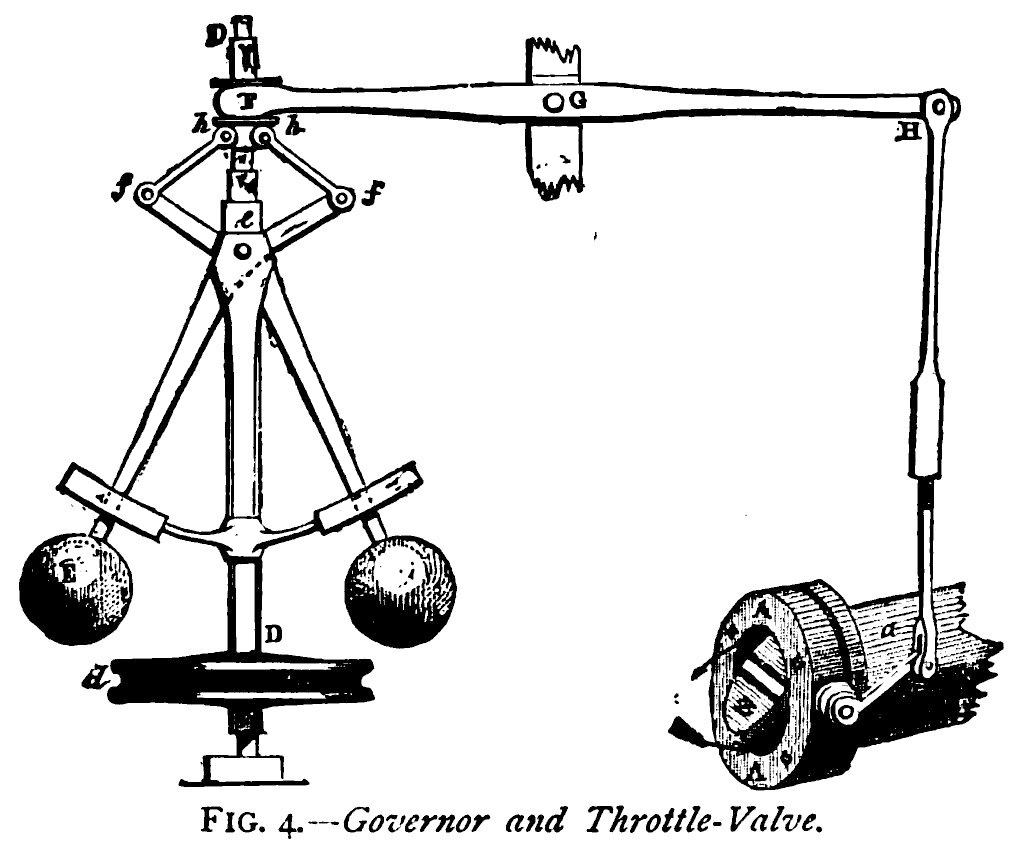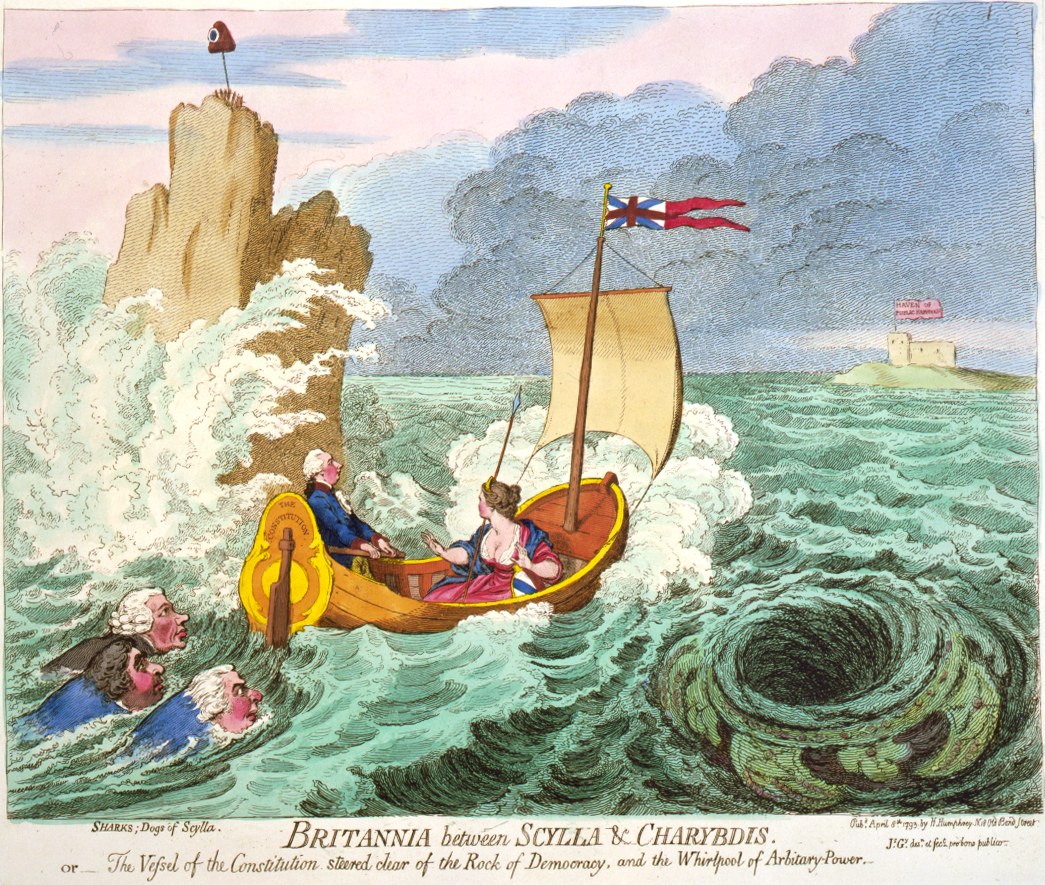Cyber means government
Today, we use the term cyber broadly to mean anything involving computers. But where does the word cyber come from?
Before it meant tech, it came from an even bigger idea, one that dates back to the ancient Greeks.
Steering to safety
The idea of government is the idea of imposing control over something. The Greeks used the same word, cybernetics, to describe two closely related ideas. It meant both “steering a ship” and “governing a society.”
Cybernetics was also used in ancient Greece to denote a governor of a country. Plato attributes Socrates as saying, "Cybernetics saves the souls, bodies, and material possessions from the gravest dangers."
Not too fast, not too slow… just right
The inventor of the steam engine, James Watt, also invented the governor, which used feedback to keep the engines spinning at a constant speed. When the balls spin too fast, the throttle is closed and the engine slows down. Too slow, and the throttle opens up to restore full speed.

The original cyber meme
In Homer’s Odyssey, Odysseus had to steer his ship between the monster of certain death Scylla, and the whirlpool of certain death Charybdis. This ancient Greek story was the original cyber meme, often referenced in political imagery and speech.
In 1793, with fresh revolutions in America and France, a political cartoon shows the Prime Minister of England steering the ship Constitution between mob anarchy and tyranny, toward “public happiness.”

image: James Gillray (1793)
The art of governing
The word cybernetics shows up again to refer to the political act of governing, referenced by the French philosopher and scientist Ampère.
The future science of government I call Cybernétique, from the word κυβερνετικὴ, taken from the Greek word for the art of steering [gouverner] a ship, to more broadly mean the art of governing in general.
Control and communications: man and machine cannot be separated
During WWII, Norbert Wiener used a $2,325 government grant to build the “AA predictor,” a device that guided anti-aircraft guns to shoot down zig-zagging enemy planes at all kinds of altitudes, speeds, and in all kinds of weather. Knowing that individual pilots behaved differently from each other, and differently under the stress of combat, it used observation and feedback to predict several seconds into the future, long enough to aim the shells to hit their targets.
Wiener thought of an airplane as an extension of the pilot, the artillery as an extension of the gunner. The man and the machine could not be separated — the combined man/machine was a single unit, which we would today call a cyborg (“cybernetic organism”). Each cyborg would steer its path in a complex dance of fake moves and deception to completing its mission, while trying to evade another man/machine adversary doing everything possible to defeat it.
After the war, he developed his ideas into a new interdisciplinary field joining math, physics, computation, language, physiology, psychology, and political science. In 1947, the same year that William Shockley demonstrated the first transistor at Bell Labs, Wiener wrote a book called Cybernetics. He compared computers and nervous systems; thought and psychopathology; information, language, and society.
We have decided to call the entire field of control and communication theory, whether in the machine or in the animal, by the name Cybernetics, which we form from the greek κυβερνήτης, or steersman… We wish to recognize that… governor is derived from a Latin corruption of κυβερνήτης.
Where do we steer today?
Our civilization today is grappling with big questions around how government and technology are steering each other. What is the role of Big Tech in supporting or undermining our democracy? Should Big Tech be regulated, and if so, how?
-
Some may cast this as a narrative of government vs. cyber. They see government as the opposite of, or even an opponent of private business.
-
Some may cast this as a zero-sum contest, where a success for one side is a loss for the other.
-
Some may say that no steering is the best steering. Complex systems may be ungovernable, for surely nobody is capable or trustworthy enough to understand, let alone attempt to guide them, so why not let them run unsupervised?
-
Some people aggressively seek immediate profitability. Getting rich means more than just having a ton of money. Making a profit changes how you are seen by others. While people can become wealthy from good luck, or from cheating, they understandably don’t like to be seen that way.
For most, wealth sends a message about superior intelligence or entitlement, which confers trustworthiness and impunity. They might have started with none of that, only luck or cheating. But now their wealth indicates they should be in control.
Who should we trust to steer us, and what should we steer toward?
It may not be wise to put our trust in those with the ability to get rich quickly or at the expense of others. As the ancient Greeks tried to warn us, a quick profit can come at the expense of terrible future harm.
So what
The idea of steering wisely goes back as far as civilization itself. Steering is the definitive act of intelligence. We use our natural intelligence to steer our way around complex threats. We build artificial systems to amplify our power to steer around those same threats.
This moment is not a zero-sum contest, and wisdom does not uniquely belong to either our elected officials or our Big Tech executives. Short-term profitability, like short-sighted navigation, does not necessarily indicate good strategic thinking.
The word cyber has been in use since the times of the ancient Greeks. Cyber means the act of governing a complex system. Good governance means making the right choices, and thinking far enough ahead to see it play out well in the long run.
SOCRATES: Or again, in a ship, if a man having the power to do what he likes, has no intelligence or skill in navigation [κυβερνητικης : kybernitikis], do you see what will happen to him and to his fellow-sailors?
ALCIBIADES: Yes; I see that they will all perish.